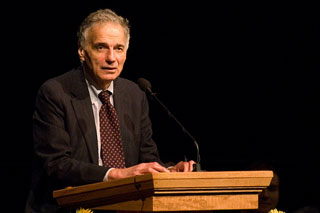The Original Nader Raider
by George Sax
The best orator among the presidential candidates looks to lose his third in a row
Ralph Nader is at the pulpit of Buffalo’s Lafayette Avenue Presbyterian Church, appealing to the consciences of the people filling the church’s pews. “What are people going to tell their grandkids?” he asks. When they want to know what their grandparents were doing when momentous events were convulsing American society, as they are now, he continues, “Will you say ‘I’m really sorry, I guess I was busy doing stuff like updating my Facebook profile’?”
By this point, about halfway through his semi-extemporized 30-minute speech last Friday, a touch of the scold and a suggestion of the prophetic have entered his performance. But judging by the reaction of the perhaps 500 people before him (both NBC News and the Buffalo News made the same crowd estimate), he hasn’t alienated his listeners. They applaud enthusiastically at all the right places. The crowd is overwhelmingly white, but its age range is very broad.

Nader had started his speech in a more laid-back, softer mode. He made a dryly self-deprecating reference to the early 20th-century socialist Eugene Debs, who ran for president five times. “With which I have some affinity,” Nader deadpans. (His current independent campaign is his third try.)
Much has been made this year about the speaking skills of the major candidates, with a great deal of attention devoted to front-runner Barack Obama. It’s likely a relatively small number of Americans will ever hear Nader orate, but based on Friday’s event, he’s a first-rate performer. He doesn’t curry approbation in the large-scaled, reach-out-and-touch manner of Bill Clinton. And he doesn’t deal in the kind of raise-the-high-beams evangelizing declarations to which Obama sometimes ascends, or descends.
And Nader is at a fundamental disadvantage. His mission isn’t to goose the commitment of the party faithful at the sort of rallies candidates customarily lead. And if the obvious needs restating, he isn’t trying to get elected. But he is attempting something almost as difficult: to ignite a movement for fundamental political and economic change. And the skill with which he made his case for its necessity, while building a connection with his audience last week was impressive. Nader can come off as something of a wonk-pedant on television, an occupational encumbrance of the leftist naysayer, but on Friday he was, if not quite warmly charming, provocative and persuasive. He deftly kept his two main thematic balls—the political domination and corruption of US corporate elites and the necessity for popular civic engagement—in the air. At 74, he may have slowed some, but it wasn’t apparent.
A little earlier, at a press conference in the church’s library, he answered reporters’ questions in perfectly formed sentences, dense with information. “Do Obama or McCain have any comprehensive program to deal with endemic poverty?” he responded to a question about the race. “…Neither Senator Obama nor McCain have a program to crack down on this corporate crime wave that’s drained trillions from workers’ savings…The giant corporations have long been on a collision course with the American people.” Here, and later in his speech, he proposed a financial-transaction tax of one percent on Wall Street that would, he said, yield $500 billion in one year, a tax like the one FDR’s New Deal imposed 75 years ago, he noted.
Afterwards, in the church sanctuary, he tells the assembled, “For 63 years, Democrats and Republicans haven’t delivered basic rights…63 years ago, Western Europe rose from the rubble of war and developed what we still lack: universal health care. The Institute of Medicine estimates 20,000 people in this country die each year from lack of care, four-week vacations, decent child care, paid maternity leave. What’s our excuse?”
The question no one asked Friday was why he’s still running for office, but an NBC correspondent posed it in another form Tuesday during the network’s evening broadcast. Is it possible, he asked, “that you’re not the best messenger for your message?”
Nader demurred, pointing to his high name recognition and reputation. It’s clear he believes it’s still possible to galvanize a movement for basic economic and political change, particularly in the present perilous and disruptive context.
His prescribed route to this goal is through the potential votes of those registered in states where Obama seems to have an insurmountable lead—a number that seems to be increasing—so that Nader’s independent movement could poll five percent of the votes cast without endangering Obama’s election. At that level, there’d be public money available to spread the word.
He challenged the audience to apply their potential power in opposition to the corporate oligarchies. If 200 people in each congressional district committed themselves to 200 hours of work and $200 in contributions annually, he said, they could form a public-interest lobby that would be “a laser beam of justice on members of Congress.”
After acknowledging the historic nature of Obama’s candidacy, and his recognizable intelligence and competence, he asks, in a sadness-inflected tone, “Are we getting more than a big upwardly mobile career move?” And he follows with a warning: “Be prepared to be very disappointed if Senator Obama is elected.”
—george sax
blog comments powered by Disqus|
Issue Navigation> Issue Index > v7n43: The Halloween Issue > The News, Briefly > The Original Nader Raider This Week's Issue • Artvoice Daily • Artvoice TV • Events Calendar • Classifieds |









 Current Issue
Current Issue